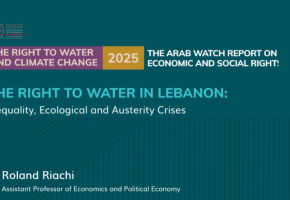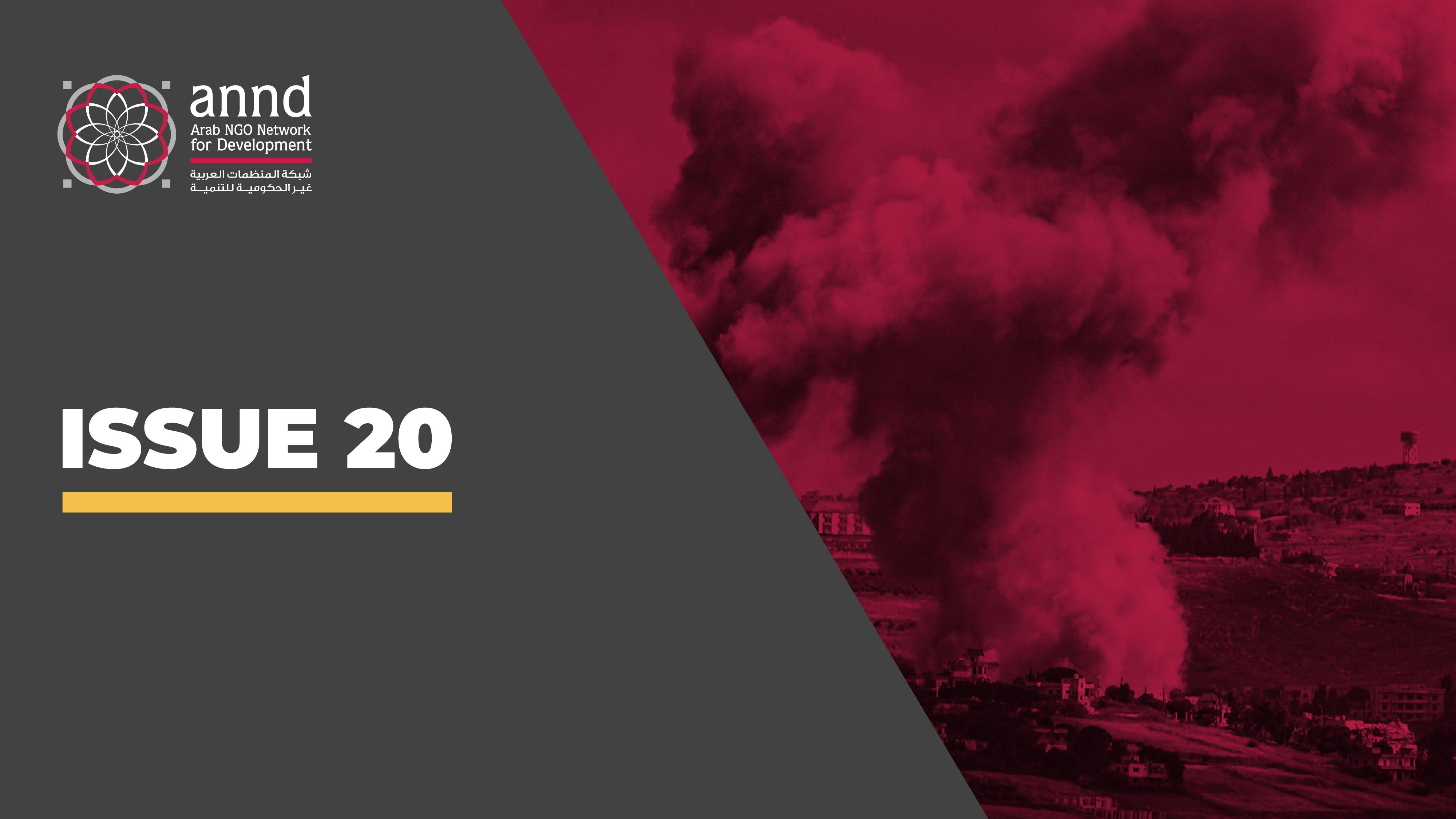
A Region on Fire
Issue 20 - October 16, 2024
Israeli War Crimes Covered by International Silence
Battlefield Developments in Lebanon
Israel committed a war crime in the city of Nabatieh in southern Lebanon, where an airstrike targeted the municipal building, resulting in the death of Mayor Ahmed Kahil, several municipal council members, crisis unit employees, relief workers, a member of the Lebanese Civil Defense, and several civilians present in and around the building. Nabatieh Governor, Howayda Turk, stated to Agence France-Presse that "11 Israeli airstrikes primarily targeted the city of Nabatieh, creating something like a fire belt." According to the Public Health Emergency Operations Center, the final toll of the Israeli strike on Nabatieh's municipality and its union buildings is 16 martyrs and 52 wounded.
The Israeli army claimed it struck dozens of Hezbollah targets in Nabatieh and dismantled underground infrastructure. They added that the 98th Division continues operations against Hezbollah in southern Lebanon, having struck more than 140 Hezbollah targets. By noon, the Israeli army had fully destroyed the village of Mhaibib, a small village consisting of 100 houses and the shrine of Prophet Benjamin (the twelfth son of Prophet Jacob and the younger brother of Prophet Joseph), located 2.5 km from the Israeli border.
Early Wednesday morning, Israeli planes launched three airstrikes on Harat Hreik in the southern suburbs of Beirut, despite U.S. assurances that Beirut would not be bombed. This comes after five days of fragile calm in the southern suburbs, where it is estimated that 95% of its residents have fled to safer areas.
The southern suburbs of Beirut comprise several municipalities and towns, with strategic importance due to the presence of Beirut International Airport, the Lebanese Ministry of Labor, and the Lebanese University complex. The area has a population of approximately 976,000, with over 70,000 housing units, and includes many churches located near mosques.
In the past 24 hours, 138 airstrikes have been recorded across various parts of Lebanon, mostly concentrated in the south and Nabatieh, bringing the total number of assaults since the start of the aggression to 10,150. The Lebanese Ministry of Health reported 17 martyrs and 182 wounded in the past 24 hours, bringing the total death toll since the start of the aggression to 2,367 martyrs and 11,106 wounded.
The Israeli Broadcasting Authority announced today that Israeli forces had captured four Hezbollah members, including a leader from the Radwan Force.
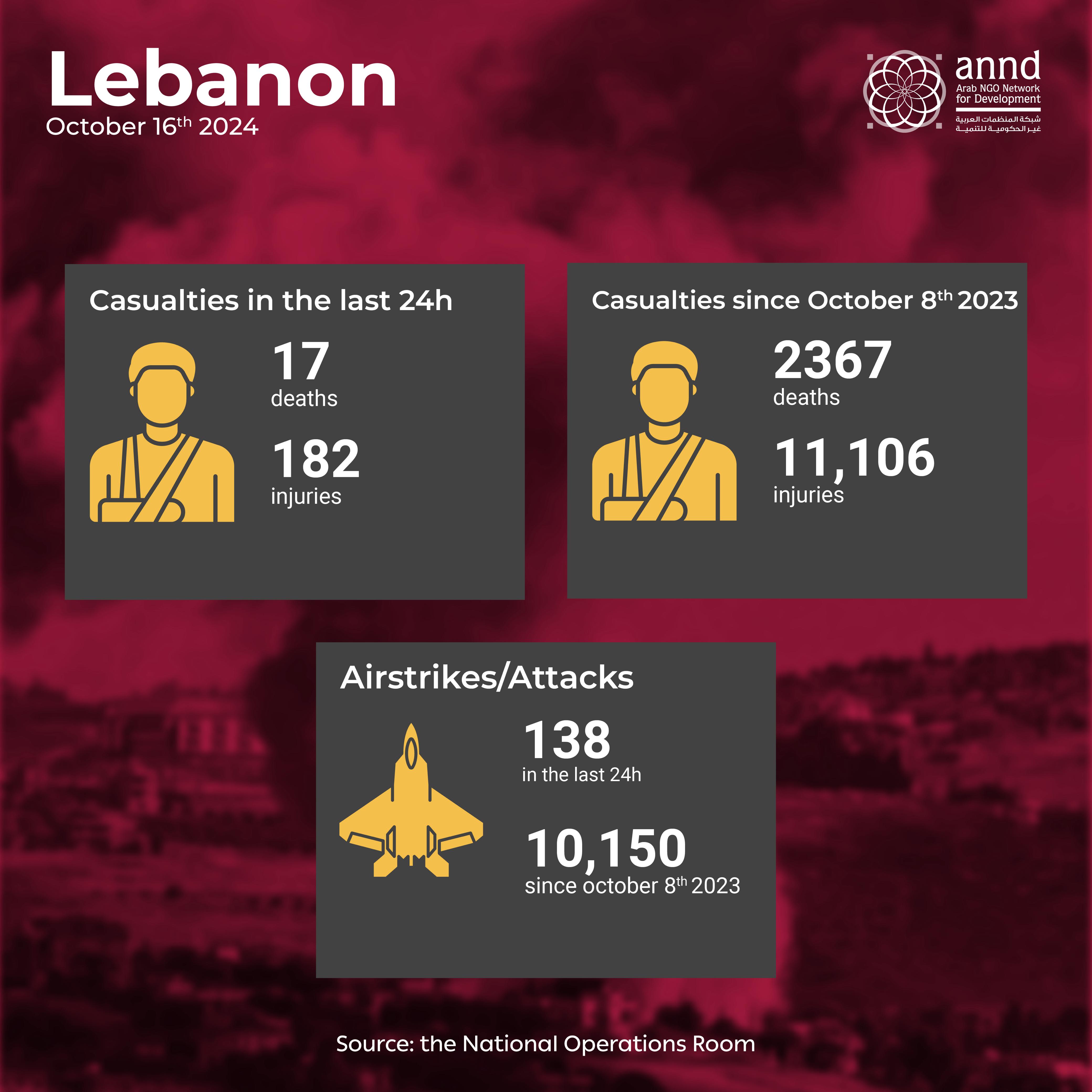
Political Positions in Lebanon
Lebanon, through its Ministry of Foreign Affairs, filed a new complaint to the United Nations Security Council regarding Israeli attacks from October 3 to 14, demanding condemnation of Israel's ongoing aggression and its full compliance with Resolution 1701, including immediate withdrawal from all Lebanese territories. Lebanon condemned Israel's continued violations of its sovereignty by land, sea, and air, indiscriminately targeting Lebanese army positions, rescue and relief agencies, and civilians. This included the bombing of Aito, the Noueiri and Ras Al-Naba areas, and other regions, resulting in hundreds of civilian casualties, the targeting of water stations, the Masnaa border crossing, and Israeli airstrikes around the UNESCO-listed Baalbek Citadel and the historic Nabatieh market.
Walid Jumblatt, after meeting with the Prime Minister and Speaker of the Parliament, emphasized the importance of returning to the Taif Agreement, avoiding internal disputes, and restoring the state's sovereignty over all Lebanese territories. He urged adherence to the 1949 Armistice Agreement between Lebanon and Israel. From Ain el-Tineh (the Speaker's residence), Jumblatt requested from the Paris conference, scheduled for October 22, to assist Lebanon. He called on major countries, particularly France and the United States, to provide practical and effective support to the Lebanese army.
Prime Minister Najib Mikati condemned the bombing of Nabatieh's municipal council, calling it yet another crime by Israel, accusing the world of deliberate silence, which encourages Israel's continued atrocities. He wondered about the benefit of resorting to the Security Council to demand a ceasefire and what could deter Israel from its crimes that have reached the point of targeting peacekeeping forces in the south, and if all the countries of the world are unable to prevent a clear aggression against the Lebanese people.
Interior Minister Bassam Mawlawi condemned the Israeli attacks on Nabatieh's municipal building, emphasizing that it occurred while coordinating relief efforts and preparing aid for residents in the war-affected towns.
At the invitation of Maronite Patriarch Bechara Rai, a Christian-Muslim spiritual summit was held in Bkerke, issuing a statement urging the UN Security Council to meet immediately to stop the ongoing humanitarian massacre in Lebanon. The statement praised UNIFIL's efforts and sacrifices in the south and called on the international community to protect them. The statement condemned Israel’s aggression against all of Lebanon, disregarding the UN and international resolutions, and emphasized the urgent need to elect a president and implement Resolution 1701. The government was urged to fulfill its responsibilities alongside Parliament and seek Arab support.
The UN Coordinator in Lebanon urged Israel to protect civilians and infrastructure, noting that civilian suffering has reached unprecedented levels.
Humanitarian Response
Environment Minister Nasser Yassin, head of the Ministerial Emergency Committee, announced efforts to provide essential services like education and healthcare for displaced persons. He stated that aid is being provided by international organizations and friendly countries, and there are efforts to mobilize ministries to support the Lebanese people.
Humanitarian and medical aid planes have arrived at Beirut airport from Saudi Arabia, Jordan, and France.
UNICEF reported that the escalating violence in Lebanon has resulted in record-level displacement and the largest wave of internal displacement in decades. The UNICEF spokesperson for the Middle East and North Africa said that more than 400,000 children are deprived of education and safety, with the majority suffering from psychological trauma.
Displacement continues from areas under daily attack, as the total number of displaced persons in designated shelters has reached 190,698 displaced persons (43,302 families), with the highest rate of displacement recorded in the governorates of Mount Lebanon and Beirut, and about 100,000 left for Syria. The Minister of Agriculture estimated that the total number of displaced persons exceeds 1,400,000 people.
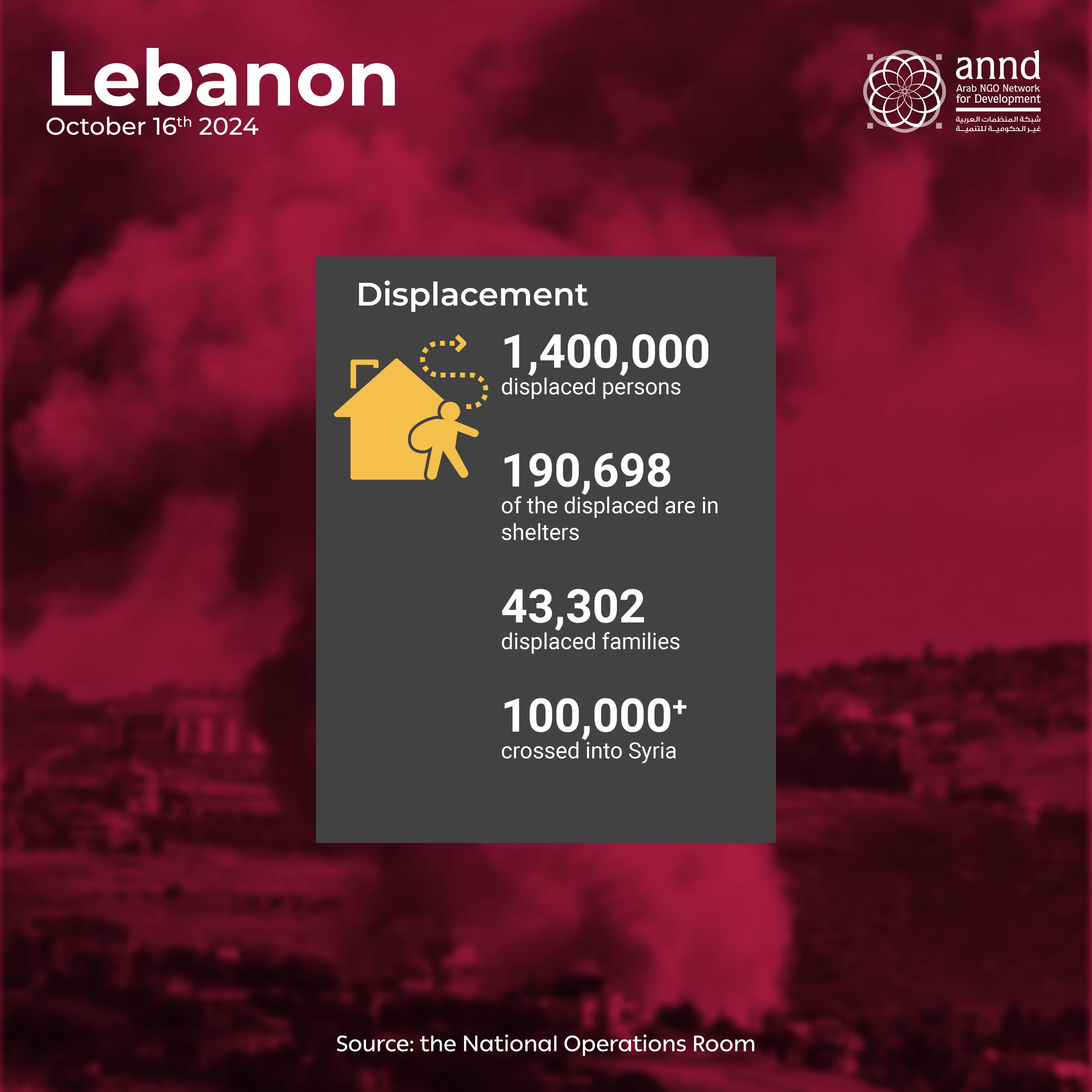
International Positions
At the EU-Gulf summit in Brussels, leaders expressed concern over the escalation in Lebanon, voiced support for the Lebanese people, and called for an immediate ceasefire. U.S., Egyptian, and Qatari leaders backed these efforts. The summit urged all parties to ensure the safety of UNIFIL personnel and reaffirmed that the 16 European Union countries deploying troops within the United Nations Interim Force in Lebanon “will remain engaged in UNIFIL”.
The President of the European Council noted that global crises have caused significant suffering, while the European Commission President stressed the need to stop the fighting in Gaza and Lebanon and to ensure humanitarian aid reaches those in need.
The US State Department said that Israel has the right to target Hezbollah and its infrastructure, but it must avoid harming civilian property, and that it does not know the reasons for the Israeli forces bombing an entire village in southern Lebanon, and that Washington does not want to destroy entire villages, and considered that Hezbollah's continued firing of rockets at Israel increases the destabilization of Lebanon and the Middle East.
In a remarkable development in the U.S. position on the war in Lebanon, The U.S. Secretary of State and Department of Defense issued a warning to Israel that they will consider the possibility of stopping the supply of weapons to it if it does not commit to not targeting civilian targets.
The U.S. imposed sanctions on three Hezbollah members and four companies, reiterating its commitment to disrupting Hezbollah's access to international financial systems.
Galant described France's ban on Israeli companies from participating in an arms fair as a "shame" and stressed that Israel would continue to defend itself against its enemies, with or without France.
Germany affirmed its continued military support for Israel, citing Israel’s right to self-defense. However, internal debates over Germany’s arms exports have led to lawsuits aimed at stopping military supplies to Israel, especially given the rising civilian death toll in Gaza to more than 42,000.
A joint Saudi-Egyptian statement expressed concern over the humanitarian disaster in Gaza and called for an immediate ceasefire in Lebanon.
The Emir of Qatar stressed that the wars in Gaza and Lebanon emphasize the urgent need for a comprehensive settlement of the conflict.
The Egyptian Foreign Minister considered that the European division over the situation in Gaza and Lebanon sends the wrong messages to Israel and the Arab countries.
The Canadian government considered that the Israeli attacks on civilian infrastructure in northern Gaza and on UNIFIL in Lebanon are unacceptable and must stop.
Iranian Foreign Minister Abbas Araghchi visited Jordan, Egypt, and Turkey to engage in diplomatic efforts aimed at stopping the wars in Gaza and Lebanon, according to the spokesman of the Iranian Foreign Ministry.
The Iranian embassy in Beirut strongly condemned the Israeli aggression in Nabatieh, which killed several people, including the city’s mayor.
Gaza
As the war on Gaza entered its 376th day, Israel continued its raids on the besieged Strip amidst demolition operations and intensive shelling of the Jabalia area, while the government media office in the Strip issued a distress call to open a safe corridor immediately to save the health system in the north.
Five Palestinians were killed and others injured early Wednesday morning in an Israeli airstrike on a house near the Italian Tower in the Al-Nasr neighborhood, northwest of Gaza, which was subjected to heavy artillery shelling.
According to a statement issued by the Government Media Office, Israel committed 3,695 massacres and atrocities in Gaza over the course of a year.
As a result of this aggression, 42,344 people were killed, while 10,000 remain missing or buried under rubble and destroyed buildings.
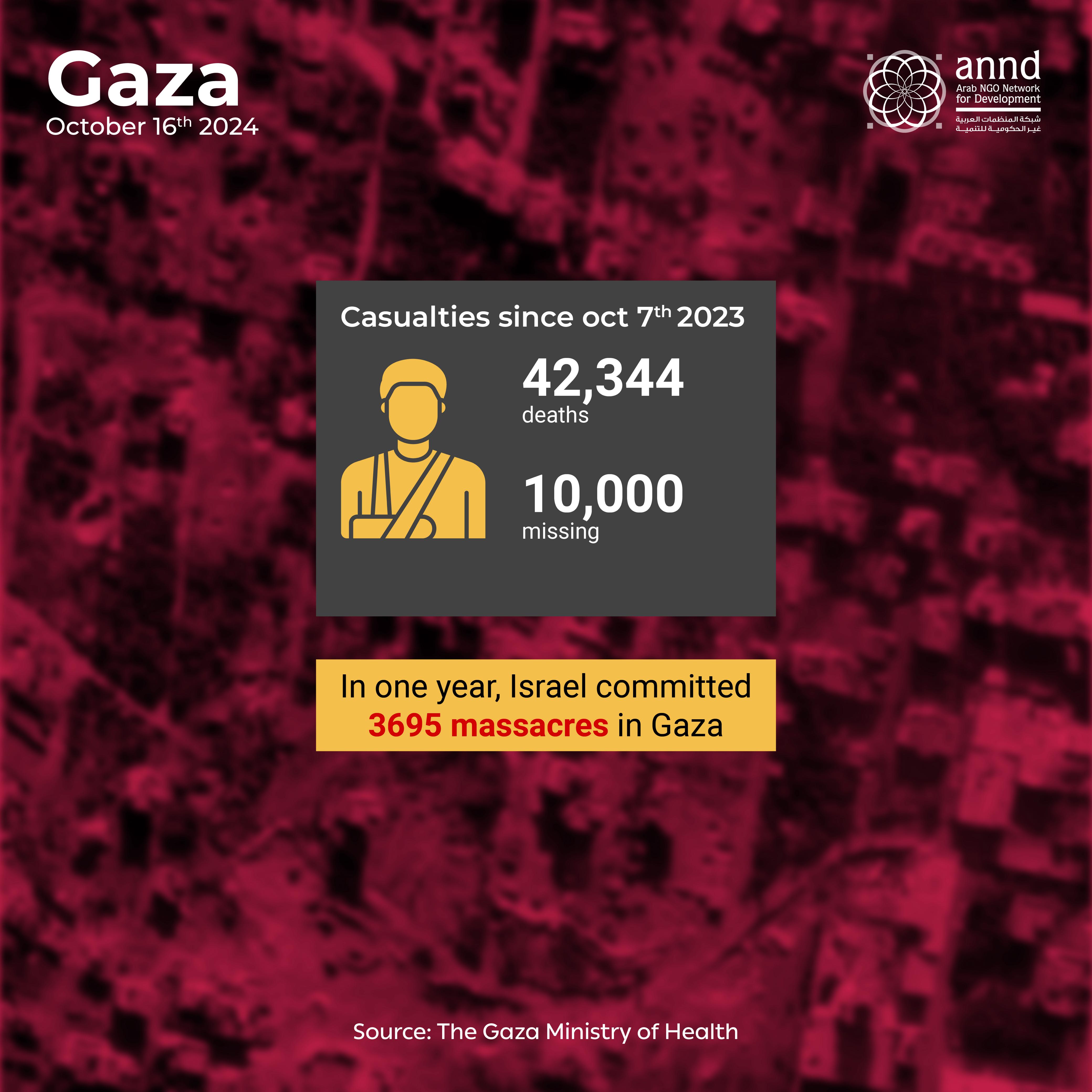
In the occupied West Bank, Israel continued its nightly raids, targeting the cities of Nablus and Halhul in the north of Hebron, as well as the city of Dura in the south.
The U.S. envoy to the United Nations stated, "We will monitor Israel's actions to ensure there is no 'starvation policy' in northern Gaza," while the U.S. State Department reported that Israel has taken measures to facilitate the entry of aid into Gaza and is monitoring the outcomes.
Recent publications
